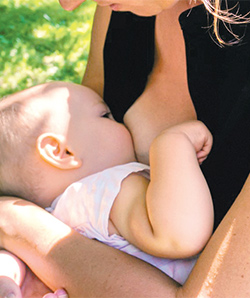When should I introduce foods?

![]() Once your baby starts eating foods, continue breastfeeding as often as he wants. If you feed your baby commercial infant formula, give him at least 750 ml (25 oz) of milk a day.
Once your baby starts eating foods, continue breastfeeding as often as he wants. If you feed your baby commercial infant formula, give him at least 750 ml (25 oz) of milk a day.
Photo: Jean-Claude Mercier
Before 6 months, most babies meet all their nutritional needs with their milk. However, their nutritional needs change as they grow.
At about six months of age, it becomes necessary to introduce foods into your baby’s diet. Your baby needs more energy and nutrients to grow and develop. The foods you introduce ensure these needs are met.
Good to know...
If you introduce foods earlier, they will replace milk instead of complementing it. What’s more, before the age of 4 months, your baby’s digestive system is not mature enough for any food except for milk.
And if you wait until later, your baby may not be getting enough nutrients, and he could have more trouble adjusting to solid food.
How do I know my baby is ready?
![]() A baby under 6 months old isn’t necessarily ready for foods just because she nurses more often for several days.
A baby under 6 months old isn’t necessarily ready for foods just because she nurses more often for several days.
It’s not always easy to determine the best time to introduce foods to your baby. But it is possible. Here’s how to tell she’s ready:
- Your baby is around 6 months old.
- Your baby can sit in a high chair without support.
- Your baby has good control of her head and can turn away to indicate refusal.
She may also try to bring food to her mouth.
Good to know...
There are additional conditions to be met before you start baby-led weaning (see Baby-led weaning (BLW)).
![]() Even if your baby is not ready for solid food yet, you can bring her close to the table at mealtimes. Watching you eat will spark her interest in food and family meals.
Even if your baby is not ready for solid food yet, you can bring her close to the table at mealtimes. Watching you eat will spark her interest in food and family meals.
![]() Contrary to popular belief, eating cereal at supper does not help infants sleep through the night. How long they sleep at night depends on their biological rhythm and temperament.
Contrary to popular belief, eating cereal at supper does not help infants sleep through the night. How long they sleep at night depends on their biological rhythm and temperament.
Some babies may need to start eating foods a little earlier than 6 months. However, a baby under 6 months old isn’t necessarily ready for foods just because she nurses more often for several days. This could be due to a growth spurt or a temporary need for more milk (see Growth spurts).
Interest in food varies greatly from one baby to another. Some need several tries before they get used to solid food, while others like it the first time they try it.
What about premature babies?
Premature babies are introduced to foods the same way as term babies are—with one key difference. You should assess your baby’s readiness based on his corrected age (see For premature babies (born before the 37th week of pregnancy)).
When a premature baby is around 6 months old (corrected age), his digestive system is mature enough for foods. Make sure that the other criteria listed on the previous page are met as well (see How do I know my baby is ready?).
Nutrients: Components of food, including vitamins, minerals, proteins, sugars, and fats.


